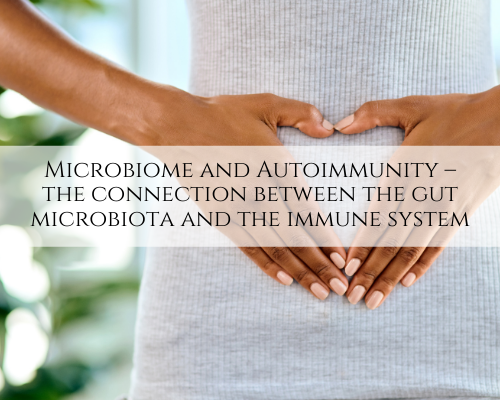What Does the Microbiome Have to Do with Autoimmunity?
Did you know that your gut “talks” to the rest of your body? Your gut is a crucial part of your health. Your gut microbiota, or your microbiome, is a complex collection of microorganisms that can benefit you greatly when balanced, or cause many issues when imbalanced. When a microbial imbalance occurs, called dysbiosis, it can trigger an autoimmune disease. That is because 80% of our immunity resides in our gut and our microbiome plays a fundamental role in whether our immunity works well or not.
What Is the Gut Microbiome?
The gut microbiome consists of trillions of microorganisms, including their genetic material. Most of these microorganisms live in our intestines. They have a few jobs including nutrient absorption, protecting us from infection, assimilating nutrients, and helping us digest our food properly. However, the role of the microbiome goes beyond the gut; it is correlated with other functions in the body including immune regulation, cognitive function, mood, and metabolism.
Our microbiome gets a jump start at birth when we are colonized with microbes from the birth canal (vaginal birth) or skin microbes (cesarean section). Immediately after birth, we are exposed to a variety of microbes from our mother and any other person around us. Some microbes will take up residence in the gut and some will set up in other parts of the body such as the mouth or skin. They will adapt to their environment.
Balanced vs. Imbalanced Gut Microbiota
Each person has a bacterial fingerprint and this is a combination of “good bacteria” and “bad bacteria.” One important measure of gut health is the diversity of gastrointestinal bacteria. Microbial diversity changes as we age and is also affected by our dietary habits, the foods we eat, and geographical origin. When the gut is balanced, the gut lining is a strong barrier- keeping harmful things out of the bloodstream, such as undigested food particles and toxins. When the gut is at its healthiest, it fights off infections, breaks down toxins, absorbs nutrients better, and supports normal immune function.
- Many, many species of harmless and beneficial bacteria live in our gut. Examples are Bacteroides, Clostridia, E. coli, Bifidobacterium, and Lactobacillus species. Only a few of them can be taken in the form of a probiotic supplement. Common probiotics are Lactobacillus casei, L. plantarum, L. rhamnosus, Bifidobacterium species, Bacillus species, and Streptococcus thermophilus.
- Bad bacteria – these bacteria are harmful to the body and can cause illness. They might be pathogens like E. coli O157 or Clostridium difficile. On the other hand, bad bacteria might be harmless unless they grow to very high numbers. Harmful bacteria make up less than 1% of all bacteria on earth. And if you have plentiful friendly bacteria, they will keep bad bacteria at bay.
The Microbiota-Gut-Brain Axis
The microbiome, gut lining, and immune system all work together. When these systems are balanced, our overall health is good. But did you know the brain is a major player in gut health, too?
The vagus nerve is the longest and most complex cranial nerve that emanates from the brain. This nerve carries signals from our digestive organs to the brain and vice versa. If the vagus nerve isn’t working well, you can’t digest your food properly. Undigested food that lingers in the gut can feed bacteria and fungus, causing belching, bloating, gas, diarrhea, or constipation. Problems with the vagus nerve mean that your stomach and intestines have trouble moving things along at a healthy pace, leading to dysbiosis.
If you are in a constant state of stress, the vagus nerve won’t do its job to promote digestion and bowel function. This can explain why people who are stuck in fight or flight mode may develop digestive symptoms and imbalanced gut microbiota.
When the microbiome, gut lining, brain, and immune system work together in harmony, it:
- Fights infections
- Balances the immune system
- Cools off inflammation
- Improves digestion and regularity
- Promotes Treg cells, which calm the immune system
- Prevents autoimmune diseases
- Blocks food sensitivities
Leaky gut
Our gut lining protects our gastrointestinal system; this intestinal lining covers more than 4,000 square feet of surface area. When balanced, the lining creates a barrier that prevents undigested food particles and toxins from getting into the bloodstream. A rich and diverse microbiome promotes a healthy gut barrier. When imbalanced, our gut lining can have large cracks or holes that allow parasites, toxins, viruses, bacteria, fungi, chemicals, and undigested food to get past our lining. This can cause inflammation, intestinal bacteria issues, food sensitivities, and trigger autoimmune diseases. This is because the intestinal barrier works together with the immune system.
Pathogens, Parasites, and Fungus, Oh My!
The gut microbiome is teeming with bacteria, fungi, parasites, and viruses. If your good bacteria are low or if you aren’t digesting well, you can develop an imbalance of these microorganisms. Pathogenic bacteria can cause diarrhea, rectal bleeding, abdominal cramping, or vomiting. These often come from food poisoning, travel, or camping. Parasites can cause nutritional deficiencies, diarrhea, weight loss, or abdominal pain. Candida or fungal overgrowth is very common. It can cause brain fog, fatigue, skin rashes, bloating, diarrhea, constipation, or even heartburn. If you eat sweets, packaged foods, and starches, then you are likely to have Candida overgrowth.
Small intestinal bacterial overgrowth or SIBO
Most of our bacteria reside in our large intestines. However, an overgrowth can occur in our small intestine and cause a variety of issues:
- Issues with digestion
- Cannot absorb nutrients properly
- Food is not fully digested and begins to ferment in the small intestines
- Distension or bloating
This overgrowth in the small intestines is known as SIBO and can cause symptoms such as
- Acid reflux
- Abdominal cramping
- Bloating
- Brain fog
- Burping
- Constipation
- Diarrhea
- Fatigue
- Gas
- Indigestion
- Joint pain
- Loss of appetite
- Nausea
- Weakness
SIBO occurs when the ileocecal valve (this separates the colon and small intestine) is no longer able to act as a barrier and allows bacteria from the large intestines to migrate up into the small intestine. When the ileocecal valve dysfunctions, the bacterial balance in the microbiome is lost.
LPS and dysbiosis of Gram-negative bacteria
LPS (lipopolysaccharide) endotoxin is found in the outer membrane of Gram-negative bacteria. LPS is a known cause of chronic immune responses and inflammation. LPS endotoxin is a structure composed of lipids (short-chain fatty acids) and sugar complexes. A potent endotoxin, LPS has been found in high levels for those with chronic kidney disease, type 2 diabetes, obesity, cardiovascular disease, and chronic inflammation.
The Relationship Between the Gut Microbiome and Autoimmune Diseases
The ecosystem between the gut microbiome, immune system, and nervous system can easily be thrown off balance by harmful bacteria, fungi, or parasites. Studies show that dysbiosis (imbalance in the gut microbial community) plays a critical role in bowel-related and autoimmune disorders.
Overgrowth of the gut microbiota creates a hostile gut, crowds out the beneficial species, and depletes short-chain fatty acids, which leads to a leaky gut. Because a balanced gut microbiome is so important to healthy immune function, imbalances can trigger autoimmune disease.
Leaky gut induces autoimmune symptoms, particularly chronic and acute inflammation, and has been associated with multiple autoimmune disorders, including type 1 diabetes and systemic lupus erythematosus.
Dysbiosis of the microbiome has been linked to many autoimmune disorders including rheumatoid arthritis, ankylosing spondylitis, type 1 diabetes, autoimmune liver disease, and multiple sclerosis. The mechanism between these is largely unknown. However, there are a few hypotheses. One is called molecular mimicry, in which components of gut bacteria confuse the immune system, leading to a mistaken attack on self-tissues. Another hypothesis is called the bystander effect, where immune cells that are fighting an infection, accidentally trigger T cells that can set off autoimmunity.
Studies show that bacterial species may influence a person’s predisposition to developing autoimmune diseases, based on the structure and function of each microbe’s specific type of lipopolysaccharides. The complex relationships between LPS endotoxins and the microbiome and autoimmune disease are still being researched.
SIBO is often associated with a range of autoimmune diseases stemming from chronic inflammation, digestive tract issues, and damage to the ileocecal valve caused by bacterial overgrowth in the small intestine. Autoimmune diseases impacted by SIBO include diabetes, celiac disease, lupus, Crohn’s disease, Hashimoto’s disease, and IBS. Approximately 60% of IBS cases are SIBO.
In conclusion, the gut, immune system, and nervous system all work together to keep you healthy. The balance of bacteria in your gut is an important part of your immune system – especially whether it triggers an autoimmune disorder or not.
How Do I Get Tested for Gut Microbiome Issues?
As with any autoimmune disease, your functional medicine doctor will need to take a careful look at your case to discover the root causes. This may include a lengthy new patient appointment and stool tests, food sensitivity tests, and/or leaky gut tests to pinpoint exactly what is triggering your autoimmunity. Once the root causes of your autoimmunity are revealed, you will begin a personalized diet, nutrition, and lifestyle plan to get you back on the road to optimum health.
Board Certified in Integrative Medicine
Certified Functional Medicine Practitioner
Institute for Functional Medicine Certified Practitioner






